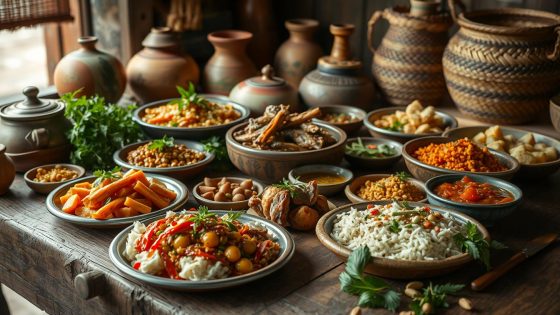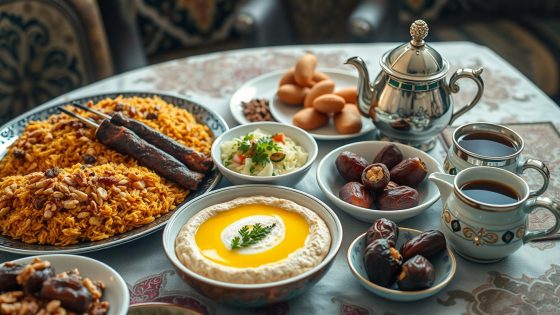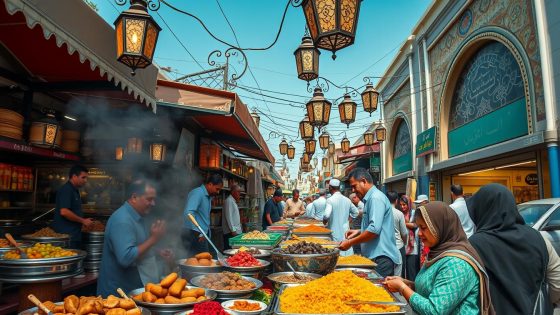Contents
The United Arab Emirates boasts a rich culinary heritage that’s worth preserving. From the aromatic spices of makbūs to the savory delights of shawarma, Emirati cuisine reflects a tapestry of cultural influences. Traditional practices in food preparation are deeply rooted in the nation’s history, making culinary preservation a top priority.
Food heritage in the UAE goes beyond mere sustenance. It’s a celebration of culture, community, and tradition. The government actively supports cultural preservation initiatives, recognizing the importance of maintaining these time-honored customs. This commitment extends to preservation techniques that ensure traditional Emirati dishes continue to grace tables for generations to come.
Interestingly, traditional arts like pottery and weaving play a crucial role in UAE’s food culture. These crafts, often economic mainstays in smaller villages, contribute to the authentic presentation of Emirati cuisine. By preserving these related traditions, the UAE safeguards its entire culinary ecosystem.
Recording Traditional Recipes
Preserving UAE’s rich culinary history is crucial for future generations. The process involves documenting family recipes and creating digital archives of regional dishes. This effort safeguards traditional food methods and ensures the survival of heritage dishes.
Documenting Family Recipes and Techniques
Family recipes form the backbone of UAE’s food customs. Many Emiratis are taking steps to record their grandmothers’ cooking secrets. They’re writing down ingredients, measurements, and unique preparation techniques. This practice helps keep traditional food methods alive.
The Ministry of Information and Culture supports this initiative. They sponsor events where families can share their treasured recipes. These gatherings celebrate the diversity of Emirati cuisine and help preserve local food traditions.
Creating Digital Archives of Regional Dishes
In today’s digital age, preserving recipes goes beyond handwritten notes. Many are turning to technology to create lasting records of UAE’s culinary heritage. Digital archives make it easy to store and share regional dishes.
Museums like Dubai Museum and Al-Ain Museum play a key role. They showcase displays on Bedouin life and pre-oil era culture. These exhibits often include information about traditional foods and cooking methods. By digitalizing this information, they ensure it’s accessible to a wider audience.
- Online recipe databases
- Food blogs featuring traditional dishes
- Video tutorials of cooking techniques
- Social media platforms for sharing family recipes
These digital efforts help keep UAE’s food traditions alive. They allow people from all over the world to learn about and appreciate Emirati cuisine. This modern approach to preserving culinary history ensures that future generations can enjoy the flavors of the past.
Promoting Cultural Awareness
The UAE takes pride in its rich culinary legacy, actively promoting cultural cuisine preservation through various initiatives. Food heritage workshops and culinary tours stand out as effective methods to educate locals and tourists about traditional Emirati cuisine.
Hosting Food Heritage Workshops
Food heritage workshops offer hands-on experiences in cultural cuisine preservation. These sessions, often held in historical settings, provide valuable food tradition tips. For instance, the Dubai Museum, located in al-Fahīdī Fort, hosts cultural Emirati breakfast sessions. These 90-minute programs give guests a taste of traditions and history.
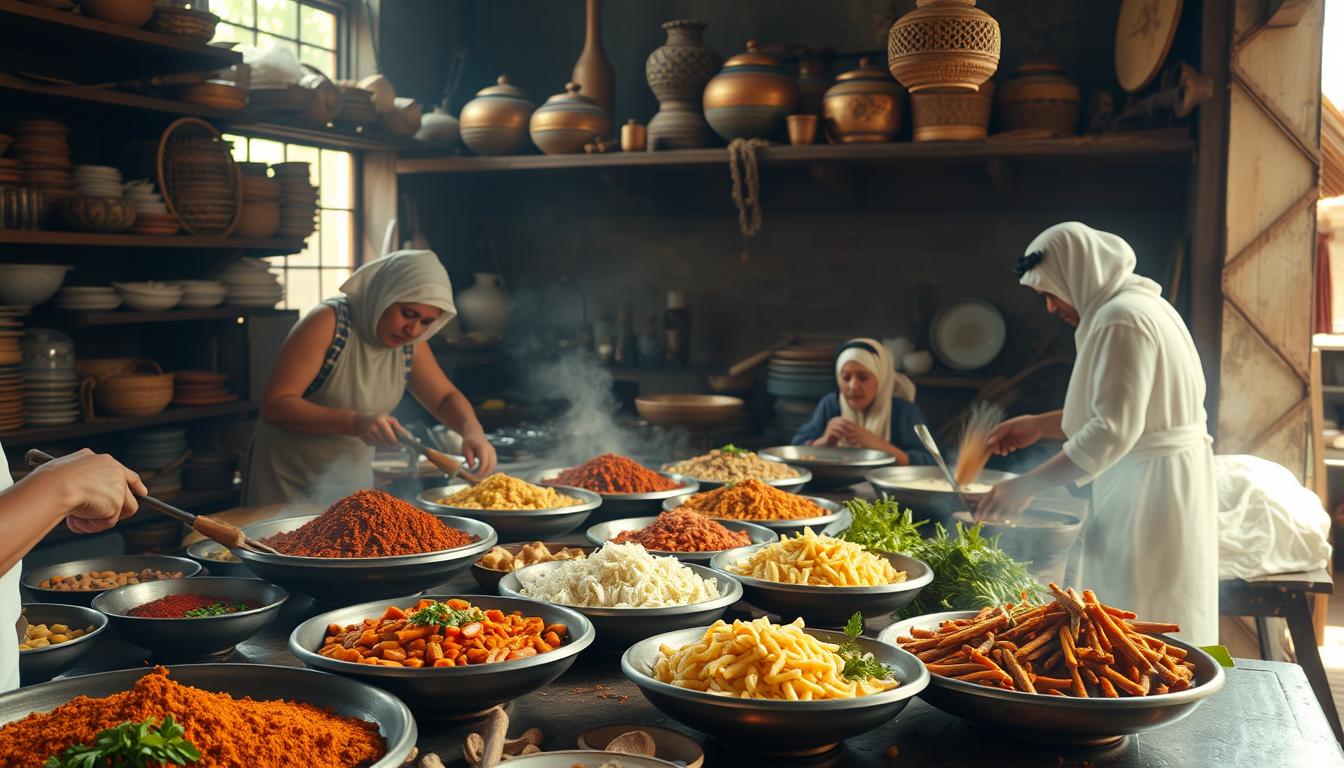
Organizing Culinary Tours
Culinary tours showcase the UAE’s culinary legacy. These tours take participants through local markets, traditional restaurants, and food festivals. The Dubai Heritage Village, which welcomed 500,000 visitors in 2023, offers a deep dive into Emirati culinary traditions. An impressive 95% of visitors reported a better understanding of Emirati culture after their visit.
| Initiative | Impact |
|---|---|
| Food Heritage Workshops | 150+ companies trust these programs for cultural understanding |
| Culinary Tours | 500,000 visitors to Dubai Heritage Village in 2023 |
| Cultural Sensitivity Training | 40% decrease in cultural insensitivity incidents during tours |
These initiatives not only preserve culinary traditions but also foster cultural exchange. The UAE’s commitment to sharing its food heritage has resulted in a richer, more authentic experience for both locals and tourists alike.
Supporting Traditional Food Producers
The UAE’s commitment to preserving its culinary legacy shines through its support for traditional food producers. This approach not only safeguards heritage dishes but also bolsters local economies and sustainable practices.
Sourcing Ingredients from Local Farmers
Local farmers play a crucial role in maintaining traditional food methods. The UAE has invested in agricultural schemes both domestically and in neighboring countries like Sudan and Egypt. This strategy ensures a steady supply of authentic ingredients for heritage dishes.
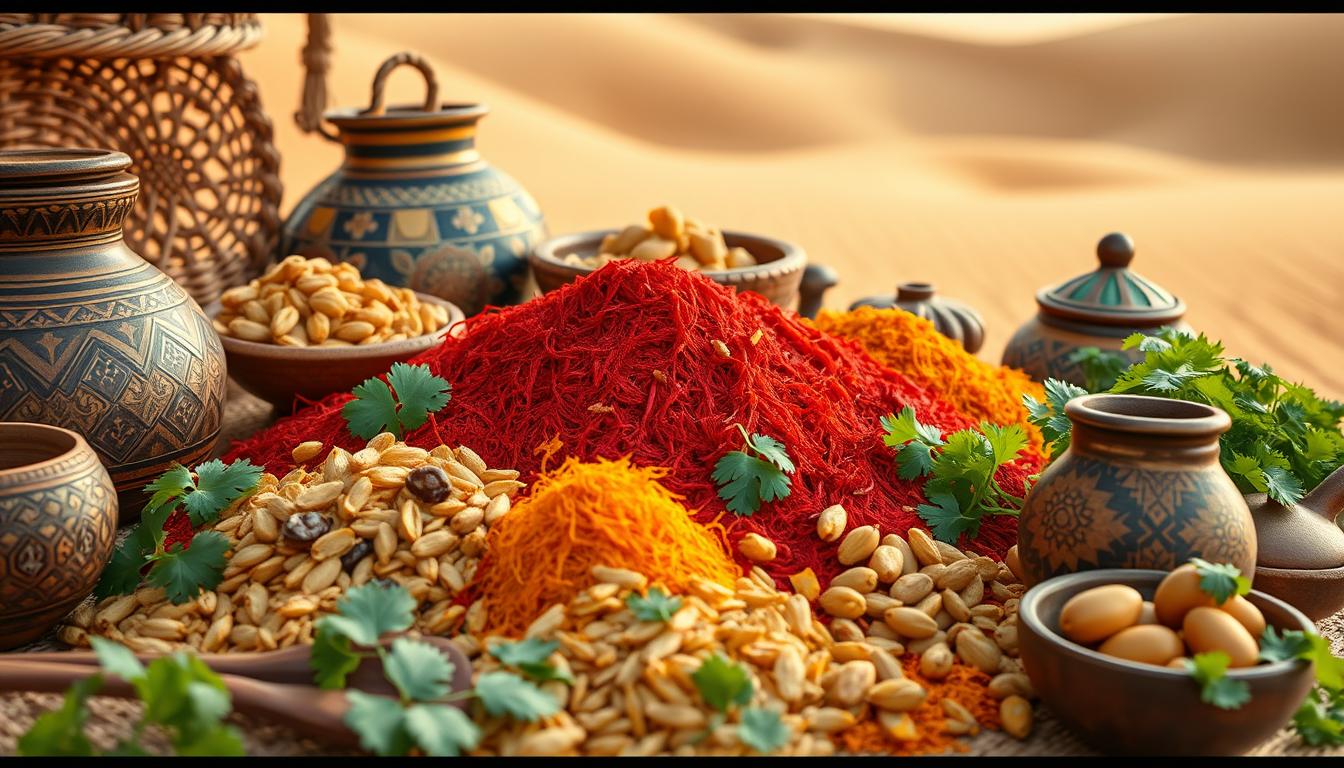
Remarkably, about 80% of food consumed or processed in the UAE comes from Sudan. This reliance underscores the importance of regional partnerships in preserving culinary traditions.
Encouraging Small-Scale Food Artisans
Small-scale food artisans are the backbone of traditional UAE cuisine. The country’s efforts to diversify its economy have created opportunities for these craftspeople to thrive. By supporting local producers, the UAE ensures the continuation of time-honored culinary practices.
| Initiative | Impact |
|---|---|
| Gene Bank for Plant Genetic Resources | Preserves traditional ingredient varieties |
| Cabinet Resolution No. (42) of 2014 | Protects heritage knowledge in food production |
| Local Farmer Support Programs | Ensures availability of authentic ingredients |
| Artisan Workshops | Promotes traditional food-making techniques |
These initiatives form a comprehensive strategy to support traditional food producers, ensuring the UAE’s rich culinary heritage continues to flourish for generations to come.
Educating the Next Generation
The UAE is taking bold steps to preserve its rich food heritage through education. By incorporating culinary traditions into school programs, young Emiratis are gaining a deeper understanding of their cultural roots. This approach to food heritage education aligns with broader efforts to foster a strong connection to local history and community welfare.
Incorporating food traditions in school programs
Schools across the UAE are integrating food heritage into their curricula. Interactive methods, such as digital presentations and hands-on cooking classes, make learning about traditional dishes engaging for students. These programs not only teach culinary skills but also emphasize the importance of healthy eating habits, addressing the rising obesity rates in the country.
Sharing family cooking practices with younger members
Families play a crucial role in cultural preservation by passing down cooking techniques to younger generations. This practice helps maintain the authenticity of traditional recipes while strengthening family bonds. The government supports these efforts through initiatives that empower women, who are often the keepers of culinary traditions. By combining family practices with formal education, the UAE is creating a comprehensive approach to food heritage preservation.
